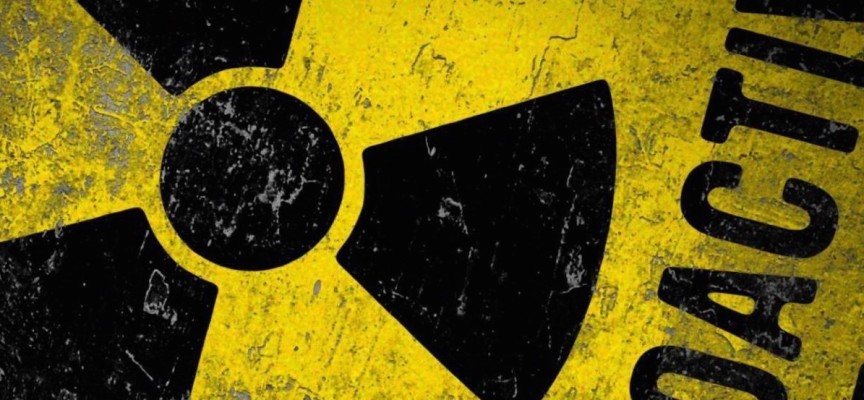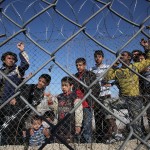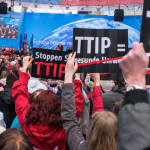After a whole month of negotiations, the ninth Review Conference of the Parties to the Treaty on the Non-Proliferation of Nuclear Weapons (NPT) did not manage to adopt a final document on 22 May 2015. Even though the draft text put before the Conference contained no new substantial measure, the failure can be laid at the door of three countries – United States, Britain and Canada – that refused to approve the proposal to convene, by March 2016 at the latest, a conference to create a zone in the Middle East that would be free of nuclear weapons and other weapons of mass destruction. Yet agreement in principle on this zone had been reached in 1995 as a condition for the indefinite extension of the NPT.
This failure is alarming. Despite its inadequacies and discriminatory character (as it reserves the exclusive monopoly of nuclear arms to five countries, the P5), the NPT is still a fundamental building block of international security and disarmament. The fact that it organises the prevention of proliferation of nuclear weapons is of general interest and its measures are legally binding on the nuclear powers to negotiate “in good faith” an end to the nuclear arms race and also nuclear disarmament. The inability of the treaty’s signatory States to agree on the state of its enforcement can only damage its international legitimacy.
It is even difficult to admit the reason behind the breakdown: how can the United States put Iran under such extremely strong pressure because of the latter’s suspicious nuclear activities, and then use its veto as cover for the refusal by Israel, a country that has a de facto nuclear arsenal, even to discuss the modalities of creating a ‘weapons of mass destruction-free zone’ in the Middle East?
On the side of the nuclear powers, gathered under the P5 umbrella, we saw that they refused to go beyond the disarmament measures contained in the “2010 Action Plan” – and even these measures are scarcely complied with, or not at all. The P5 are still putting nuclear weapons at the core of their defence policies, allocating huge resources to the “modernisation” of their weapons systems and drawing a thick veil over the status of their nuclear arsenals.
France, however, has proposed a draft treaty to ban the production of fissile materials for military use. This draft could make a useful contribution to disarmament insofar as it would limit any increase in numbers of warheads, but it has to be admitted that its constraints would be cumbersome in practice, most of all for the countries with a relatively undeveloped nuclear arsenal.
More encouraging developments have emerged on the side of the non-nuclear countries. A large number of them were able to get together on the question of the humanitarian impact of nuclear weapons in the third of the international conferences focusing on this topic since 2013. What is at stake in this initiative is asking the nuclear powers to make every possible effort to avoid any nuclear strike, either accidental or deliberate. 158 States, including Britain and the United States, attended the most recent conference in this series, held at Vienna in December 2014.
At the end of the Vienna Conference sessions it was noted that nuclear weapons, in contrast to chemical and biological weapons, are the only weapons of mass destruction not covered by any legal regime to ban them, while the consequences for humanity of using them would be catastrophic. The Austrian proposal to close this moral and legal gap by drawing up a treaty to ban nuclear weapons gained the backing of over 100 countries during the Review Conference. It would indeed be a happy day if, given the difficulties encountered in the NTP Conferences and the Geneva Conference on Disarmament, the United Nations meeting in General Assembly were able to pick up this issue and establish a working group for this purpose.
The timing of the recently ended Review Conference is of particular significance, as it was held after the conclusion of a framework agreement guaranteeing Iran’s observance of its non-proliferation obligations. Maybe the United States and the two countries joining the American position in their blocking action had intended to minimise the criticism in Israel before the final ruling on the Iranian nuclear issue, expected to be delivered on 30 June 2015.
It would certainly not be the first time that a Review Conference failed, but in the context of the current international tensions, we cannot help but be worried by this new attack on the regime of proliferation in its context of disarmament. For civil society this must serve as a strong incentive to work with relentless efforts to ensure a genuine nuclear disarmament.
(source: Europeinfos #183)
La nona Conferenza d’esame del trattato di non proliferazione delle armi nucleari (TNP), il 22 maggio 2015, dopo un mese di trattative non è riuscita ad adottare un documento finale. Mentre la proposta presentata alla Conferenza non conteneva alcuna nuova misura significativa, il fallimento è stato causato dal rifiuto di tre Paesi – Stati Uniti, Regno Unito e Canada – di accettare la proposta di convocare, al più tardi nel marzo 2016, una conferenza sulla creazione di una zona libera da armi nucleari e altre armi di distruzione di massa in Medio Oriente. Eppure l’accordo su questa zona era già stato raggiunto nel 1995 come condizione per l’indefinita estensione del TNP.
Questo fallimento è allarmante. Nonostante i limiti e la natura discriminatoria, che riserva a cinque Paesi il monopolio esclusivo delle armi nucleari, il TNP rimane un elemento fondamentale della sicurezza internazionale e del disarmo: la prevenzione della proliferazione nucleare che esso definisce è d’interesse generale e le sue disposizioni rendono legalmente vincolanti le potenze nucleari a negoziare “in buona fede” la fine della corsa agli armamenti e il disarmo nucleare. Il fallimento degli Stati a raggiungere un accordo sullo status della sua applicazione può solo danneggiarne la legittimità internazionale.
È persino difficile ammettere la ragione del fallimento: come possono gli Stati Uniti esercitare la massima pressione sull’Iran per le sue attività nucleari sospette, e coprire il loro veto Israele, Paese detentore di fatto di armi nucleari, che si rifiuta anche solo di discutere le modalità della creazione di una zona libera da armi di distruzione di massa in Medio Oriente?
Per quanto riguarda le potenze nucleari, alleate nel P5, c’è stato il rifiuto ad andare al di là delle misure di disarmo contenute nel “Piano d’azione” del 2010, rispettate poco o male: continuano a dare un posto centrale alle armi nucleari nelle loro strategie di difesa, destinano risorse considerevoli a “modernizzare” i loro sistemi d’armi e mantengono l’opacità sullo stato delle loro armi nucleari.
La Francia però ha proposto un progetto di trattato che vieti la produzione di materiale fissile per scopi militari. Questo progetto potrebbe contribuire utilmente al disarmo limitando la crescita quantitativa delle armi, ma va notato che i vincoli peserebbero, di fatto, soprattutto sui paesi con arsenale relativamente poco sviluppato.
Sviluppi più incoraggianti sono emersi da parte dei Paesi non nucleari. Molti di loro sono stati in grado di trovare un consenso attorno alla questione dell’impatto umanitario delle armi nucleari, in linea con le conferenze internazionali dedicate a questo tema dal 2013. L’obiettivo di questo percorso è di chiedere alle potenze nucleari di adottare tutte le misure necessarie per evitare un attacco nucleare, accidentale o deliberato. 158 Stati, tra cui il Regno Unito e gli Stati Uniti, hanno partecipato alla scorsa Conferenza tenutasi a Vienna, in questo contesto, nel dicembre 2014.
A seguito dei lavori della Conferenza di Vienna, si è constatato che le armi nucleari, a differenza delle armi chimiche e biologiche, sono le uniche armi di distruzione di massa che non sono oggetto di alcun regime legale di divieto, sebbene le conseguenze umanitarie del loro impiego potrebbero essere catastrofiche. La proposta austriaca di colmare questa lacuna morale e giuridica con l’elaborazione di un trattato che vieti le armi nucleari ha ricevuto l’appoggio di oltre un centinaio di paesi durante la conferenza d’esame. Sarebbe positivo se, date le difficoltà incontrate nelle conferenze del TNP o nella Conferenza sul disarmo di Ginevra, l’Assemblea Generale delle Nazioni Unite si assumesse questa questione e definisse a tal fine un gruppo di lavoro.
La Conferenza d’esame appena conclusa si è collocata in un contesto particolare, dopo la conclusione di un accordo quadro per garantire il rispetto da parte dell’Iran dei suoi obblighi di non proliferazione. Forse gli Stati Uniti e i due Paesi che hanno aderito al blocco volevano ridurre al minimo le critiche israeliane prima della soluzione definitiva della questione nucleare iraniana prevista per il 30 giugno 2015.
Non è certo la prima volta che una Conferenza d’esame fallisce, ma nel contesto delle attuali tensioni internazionali non ci si può che allarmare di fronte a questo nuovo attentato al regime di non proliferazione nella sua dimensione del disarmo. Ciò deve essere per la società civile un forte incentivo a non diminuire gli sforzi in favore di un vero e proprio disarmo nucleare.
(fonte: Europeinfos #183; traduzione italiana a cura di Eurcom)
Un signe alarmant pour les armes nucleaires
La neuvième Conférence d’examen du Traité sur la non-prolifération des armes nucléaires (TNP) n’est pas parvenue, le 22 mai 2015, après un mois de négociations, à adopter un document final. Alors que le projet soumis à la conférence ne contenait aucune mesure nouvelle d’importance, l’échec a été provoqué par le refus de trois pays – les États-Unis, le Royaume-Uni et le Canada – d’accepter la proposition de réunir au plus tard en mars 2016, une conférence sur la création d’une zone exempte d’armes nucléaires et d’autres armes de destruction massive au Moyen-Orient. Le principe de cette zone était pourtant agréé depuis 1995 comme une condition de la prorogation indéfinie du TNP.
Cet échec est alarmant. Malgré ses insuffisances et son caractère discriminatoire, puisqu’il réserve à cinq pays le monopole exclusif de l’armement nucléaire, le TNP reste un élément fondamental de la sécurité internationale et du désarmement : la prévention de la prolifération nucléaire qu’il organise est d’intérêt général et ses dispositions font juridiquement obligation aux puissances nucléaires de négocier « de bonne foi » la fin de la course aux armements et le désarmement nucléaires. L’incapacité des États parties à ce traité de s’accorder sur l’état de son application ne peut que nuire à sa légitimité internationale.
Le motif de l’échec est en lui-même difficile à admettre : comment les États-Unis peuvent-ils exercer les plus grandes pressions sur l’Iran, en raison de ses activités nucléaires suspectes, et couvrir par leur veto le refus d’Israël, pays détenteur de fait de l’arme nucléaire, de seulement discuter des modalités de création d’une zone exempte d’armes de destruction massive au Moyen-Orient ?
Du côté des puissances nucléaires, coalisées au sein du P5, on a observé un refus d’aller au-delà des mesures de désarmement contenues dans le « Plan d’action » de 2010 alors même qu’elles les respectent peu ou mal : elles accordent toujours une place centrale à l’arme nucléaire dans leurs doctrines de défense, consacrent des moyens considérables à la « modernisation » de leurs systèmes d’armes et maintiennent l’opacité sur l’état de leur armement nucléaire.
La France a cependant proposé un projet de traité d’interdiction de la production des matières fissiles à usage militaire. Ce projet pourrait contribuer utilement au désarmement dans la mesure où il limiterait l’accroissement quantitatif des armes mais il faut bien constater que ses contraintes pèseraient en pratique surtout sur les pays à l’arsenal relativement peu développé.
Des évolutions plus encourageantes sont apparues du côté des pays non nucléaires. Un grand nombre d’entre eux ont su se rassembler autour de la question de l’impact humanitaire des armes nucléaires, dans le prolongement des conférences internationales consacrées à cette question depuis 2013. L’enjeu de cette démarche est de demander aux puissances nucléaires de prendre toutes les mesures nécessaires pour éviter un tir nucléaire, par accident ou de façon délibérée. 158 États, dont le Royaume-Uni et les États-Unis, ont participé à la dernière conférence tenue à Vienne dans ce cadre en décembre 2014.
À l’issue des travaux de la conférence de Vienne, il a été constaté que les armes nucléaires, contrairement aux armes chimiques et biologiques, sont les seules armes de destruction massive qui ne font l’objet d’aucun régime juridique d’interdiction, alors que les conséquences humanitaires de leur emploi risqueraient d’être catastrophiques. La proposition autrichienne de combler cette lacune morale et juridique par l’élaboration d’un traité d’interdiction des armes nucléaires a reçu, lors de la Conférence d’examen, le soutien de plus d’une centaine de pays. Il serait heureux que, compte tenu des difficultés rencontrées au sein des conférences du TNP ou de la Conférence du désarmement de Genève, l’Assemblée générale des Nations unies puisse se saisir de cette question et établir à cette fin un groupe de travail.
La Conférence d’examen qui vient de s’achever intervenait dans un contexte particulier, après la conclusion d’un accord cadre garantissant le respect par l’Iran de ses obligations de non-prolifération. Peut-être les États-Unis et les deux pays qui se sont associés à leur démarche de blocage ont-ils voulu minimiser les critiques israéliennes avant le règlement définitif de la question nucléaire iranienne qui devrait intervenir le 30 juin 2015.
Ce n’est certes pas la première fois qu’une conférence d’examen échoue mais, dans le contexte des tensions internationales actuelles, on ne peut qu’être inquiet devant cette nouvelle atteinte portée au régime de prolifération dans sa dimension de désarmement. Ce doit être, pour la société civile, une incitation forte à ne pas relâcher ses efforts en faveur d’un authentique désarmement nucléaire.
(source: Europeinfos #183)
Ein alarmierendes signal fur die kernwaffen
Nach vierwöchigen Beratungen ist es den Teilnehmerstaaten der neunten Überprüfungskonferenz zum Atomwaffensperrvertrag (Nuklearer Nichtverbreitungsvertrag – NVV) nicht gelungen, sich am 22. Mai 2015 auf ein gemeinsames Abschlussdokument zu einigen, und dies, obwohl auf der Tagesordnung keinerlei wesentliche Neuerung vorgesehen war. Die Konferenz scheiterte am Nein dreier Länder – den USA, Großbritannien und Kanada – zum Vorschlag, bis März 2016 eine Konferenz einzuberufen, auf der die Einrichtung einer atomwaffen- und massenvernichtungswaffenfreien Zone im Nahen Osten beschlossen werden sollte. Die Schaffung einer solchen Zone war bereits 1995 als Voraussetzung für eine unbefristete Verlängerung des NVV vereinbart worden.
Das Scheitern der Konferenz ist alarmierend. Auch wenn es sich um einen ungleichen Vertrag mit vielen Unzulänglichkeiten handelt, da er fünf Staaten (die sogenannten P5) das ausschließliche Privileg einräumt, Kernwaffen zu besitzen, bleibt er doch ein grundlegendes Instrument für die internationalen Sicherheits- und Abrüstungsbemühungen: Zum einen ist die vereinbarte Nichtverbreitung von Kernwaffen im Interesse aller, zum anderen sind die Kernwaffenstaaten durch diesen Vertrag rechtlich verpflichtet, „nach bestem Wissen und Gewissen“ über ein Ende des atomaren Wettrüstens und die Abrüstung zu verhandeln. Die Unfähigkeit der Teilnehmerstaaten, sich über die Vertragsumsetzung einig zu werden, schwächt unweigerlich die internationale Bedeutung des NVV.
Der Grund für das Scheitern ist nur schwer vermittelbar: Wie kann es sein, dass die Vereinigten Staaten einerseits intensiven Druck auf den Iran ausüben, damit dieser seine verdächtigen Aktivitäten im Atomsektor einstellt und sich andererseits mit ihrem Veto schützend vor Israel stellen, das faktisch ein Kernwaffenstaat ist, aber nicht einmal die Bereitschaft zeigt, über die Einrichtung einer atomwaffen- und massenvernichtungswaffenfreien Zone im Nahen Osten überhaupt auch nur zu diskutieren?
Die P5-Koalition verweigert jegliche Abrüstungsmaßnahmen, die über die bereits 2010 im „Aktionsplan“ vereinbarten Vorgaben hinausgehen würden, wobei sie Letztere im Übrigen kaum oder nur lückenhaft einhält. So spielen die Atomwaffen in der Verteidigungsdoktrin der Kernwaffenstaaten weiterhin eine zentrale Rolle, die P5 wenden erhebliche Mittel für die „Modernisierung“ ihrer nuklearen Waffensysteme auf und halten den Rest der Welt über ihre Kernwaffenarsenale im Unklaren.
Immerhin hat Frankreich einen Vertragsentwurf für das Verbot der Produktion spaltbaren Materials für Waffenzwecke vorgelegt. Dieser Ansatz könnte insofern zur Abrüstung beitragen, als er eine quantitative Zunahme der Kernwaffen begrenzen würde. Dies würde aber vor allem die Länder treffen, die ohnehin nur über ein geringes atomares Waffenpotenzial verfügen.
Vielversprechender sind da die von Seiten der Nichtkernwaffenstaaten verfolgten Ansätze. Ein Großteil von ihnen unterstützt die Fortsetzung der seit 2013 laufenden Regierungskonferenzen zur Frage der humanitären Folgen von Atomwaffen. Zentraler Punkt dieser Kampagne ist die Forderung an die Atommächte, alle notwendigen Maßnahmen zu treffen, um den absichtlichen oder unbeabsichtigten Abschuss einer Atomwaffe zu verhindern. 158 Staaten, darunter Großbritannien und die USA, hatten an der letzten Konferenz über die humanitären Folgen von Atomwaffen im Dezember 2014 in Wien teilgenommen.
Am Ende der Wiener Konferenz war festgestellt worden, dass Kernwaffen im Gegensatz zu biologischen und chemischen Waffen die einzigen Massenvernichtungswaffen sind, die nicht rechtsverbindlich verboten sind, deren humanitäre Folgen jedoch katastrophal wären. Der Vorschlag Österreichs, diese moralische wie rechtliche Lücke zu schließen und einen Vertrag zum Verbot nuklearer Waffen zu schließen, wurde auf der Überprüfungskonferenz von mehr als hundert Ländern unterstützt. Es wäre zu begrüßen, wenn die Generalversammlung der Vereinten Nationen angesichts der Schwierigkeiten der NVV-Überprüfungskonferenzen bzw. der Genfer Abrüstungskonferenz diese Frage aufgreifen und eine ad-hoc-Arbeitsgruppe einsetzen würde.
Die soeben zu Ende gegangene Überprüfungskonferenz fand insofern in einem besonderen Kontext statt, als sich der Iran in einem Rahmenabkommen zur Einhaltung seiner Nichtverbreitungsverpflichtungen bereit erklärt hat. Vielleicht wollten die USA und die beiden anderen Nein-Sager, die sich der amerikanischen Blockadehaltung angeschlossen haben, vor der für den 30. Juni 2015 vorgesehenen endgültigen Beilegung des Atomstreits mit dem Iran, den Zorn Israels nicht heraufbeschwören.
Auch wenn es nicht das erste Mal ist, dass eine Überprüfungskonferenz scheitert, so ist es angesichts der aktuellen internationalen Spannungen doch sehr besorgniserregend, wenn wieder einmal Abrüstungsvereinbarungen nicht eingehalten werden. Für die Zivilgesellschaft heißt dies, dass sie in ihren Bemühungen um echte atomare Abrüstung nicht nachlassen darf.
(quelle: Europeinfos #183)
Michel Drain
Latest posts by Michel Drain (see all)
- Alarm signals for the nuclear weapons - 8 giugno 2015











